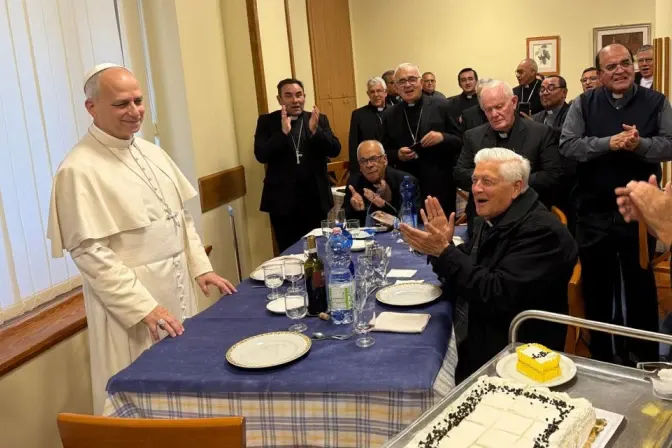"The Hong Kong High Court's decision to sentence Jimmy Lai to 20 years is an unjust and tragic conclusion to this case," said U.S. Secretary of State Marco Rubio in a Feb. 9 statement.
Jimmy Lai, Catholic entrepreneur and media tycoon, was sentenced on Feb. 9 to 20 years in prison over what Chinese officials claim were national security violations.
The sentencing comes after Lai's December 2025 conviction, which ended several years of what advocates have described as a politically motivated show trial. Lai, founder and publisher of the outspoken pro-democracy tabloid Apple Daily, was first arrested in 2020 after alleged violations of Chinese national security policy.
Lai's ongoing case has drawn support from lawmakers, activists, religious leaders, and political leaders around the world including President Donald Trump, who has advocated for Lai's release and reportedly spoke to Chinese President Xi Jinping about the issue in October 2025.
The sentencing "shows the world that Beijing will go to extraordinary lengths to silence those who advocate fundamental freedoms in Hong Kong, casting aside the international commitments Beijing made in the 1984 Sino-British Joint Declaration," Rubio said.
The joint treaty was signed by the U.K. and China establishing the transfer of sovereignty over Hong Kong from Britain to the People's Republic of China. It guaranteed Hong Kong a "high degree of autonomy" to maintain its capitalist system and freedoms.
"After enduring a trial lasting two years, and detention in prison for more than five, Mr. Lai and his family have suffered enough," Rubio said. "The United States urges the authorities to grant Mr. Lai humanitarian parole."
Catholic Rep. Chris Smith, R-New Jersey, also condemned the "unconscionable" 20-year sentence.
Smith has been a prominent voice in promoting Lai's cause by authoring legislation and chairing numerous congressional hearings to raise awareness of his case and call for his release.
"Jimmy Lai is a man of faith and conscientious conviction, and he should be released immediately. Despite — or perhaps in spite of — his life's work as a legendary entrepreneur and a lion of free speech, Jimmy has been unjustly prosecuted and persecuted by functionaries who, for all purposes, are lackeys of the Chinese Communist Party," Smith said in a statement.
"President Trump has spoken eloquently on his behalf, and I ask the president to continue to prioritize Jimmy Lai's release, as well as the releases of Americans unjustly detained in China. Jimmy's poor health, due to his advanced age and mistreatment in prison, only underscores the necessity of his prompt release on humanitarian grounds," Smith said.
Smith emphasized that "time is of the essence" and said the U.S. "must use all diplomatic and economic tools at its disposal to advocate for the release of heroes like Jimmy Lai."
Sen. Jeff Merkley, D-Oregon, who has also been a longtime advocate of Lai's, said the sentencing was "for the 'crime' of journalism." It "should put to rest any illusion that the Chinese government will relent until it exercises total control over the people of Hong Kong," he said in a statement.
"This sham trial, carried out via Hong Kong officials acting on China's behalf, is an attempt by the Chinese government to extinguish press freedom, an effort that will never succeed as long as there are people like Lai who are brave enough to risk everything to speak the truth," he said.
"There can be no business as usual while the Chinese government continues its campaign of brutal oppression against Hong Kongers. That includes Beijing's reliance on institutions such as Hong Kong Economic and Trade Offices (HKETOs) to surveil political activism and push Chinese government propaganda in the United States," he said.
"Republicans and Democrats must stand united in the defense of the people of Hong Kong," Merkley said. The senator is working to pass a measure to "impose real consequences on China — including the potential removal of diplomatic privileges from HKETOs — as a meaningful response to destroying Hong Kong's autonomy."
The U.S. "must signal unequivocally that Beijing's crackdown in Hong Kong is unacceptable," Merkley said. "We will never abandon those fighting for democracy, human rights, and the rule of law."
Lai's team: 'The situation could not be more urgent'
Lai's international team has also spoken out following the sentencing, calling attention to the lack of rule of law in Hong Kong.
"Today marks the final blow to the rule of law in Hong Kong," said Caoilfhionn Gallagher, lead counsel of Lai's international legal team, in a press release. "Sentencing Jimmy Lai — already aged 78 — to two decades behind bars is an affront to justice and the culmination of over five years of malicious lawfare against a courageous, elderly British citizen and prisoner of conscience."
"Now that this sham trial is finally over, we call on leaders from around the world to speak with one voice in their demand for China to free Jimmy Lai so he can come home to his family in London at last," she said.
"Also sentenced today was the company itself, the company through which Apple Daily, the newspaper, was run so successfully for so long, and the other digital media outlets Mr. Lai founded and ran in Hong Kong," Jonathan Price, human rights barrister with the international legal team for Jimmy Lai, said during a Feb. 9 press conference.
"Those companies were fined 3 million Hong Kong dollars, despite the court acknowledging that they were insolvent and they have no means of paying it. What that demonstrates is the total destruction of press freedom and the rule of law in Hong Kong," he said.
"Sentencing sends a crystal clear message that … lawful dissent in Hong Kong will no longer be tolerated. Twenty years is a very long time in anyone's life. Mr. Lai … is 78 years old. His health is rapidly failing. The situation could not be more urgent," he said.


